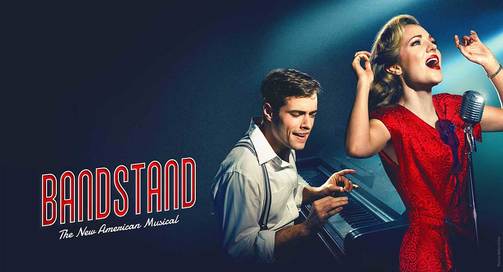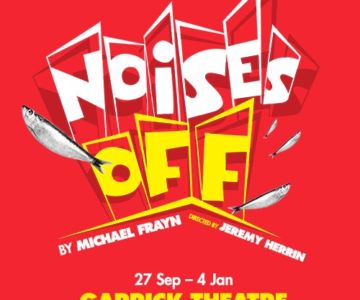 Equus at Theatre Royal Stratford East: Insanity Beyond Reproachby Randi / March 19, 2019
Equus at Theatre Royal Stratford East: Insanity Beyond Reproachby Randi / March 19, 2019It’s Theatre Thursday! Today’s show is Jesus Hopped the “A” Train, playing at the Young Vic until April 6.
I love going into shows blind, knowing as little as possible about the plot or even what type of show it is. With Jesus Hopped the “A” Train, I have never been so surprised by a show’s subject matter. Even though the play is from 2000, I managed to miss it the first time-round (‘twas a child) and so with that intriguing title, my brain assumed it was about trains, and probably Jesus. It is not about trains, though it is sort of about Jesus, or religion in general. What Jesus, A Train! (best fake title) really is about is the horrors of the United States prison system, a subject that needs to be spoken about more and in harsher words. This play, by Stephen Adly Guirgis, definitely understands the need to denounce the broken system, but the result is more like a set of speeches than a play.
That’s great for actors preparing for auditions, since the monologues in this show are often powerful and seem important, perfect for showing off out of context. But it’s not great for a cohesive drama, with a plot, with a dramatic purpose. It’s two hours of monologues. Even the ‘dialogue’ between characters is, if you look closely, really a monologue followed by a one word response, lather rinse repeat. With this composing the show, you see that Guirgis had a lot of important things to say, a lot a lot, but without fitting these thoughts into a structured drama, it’s unclear what he’s actually saying.
As for the thin narrative, it’s about a young man who is imprisoned for shooting a despised cult leader, an act of violence that by all accounts is warranted, but vigilante justice isn’t rewarded when the perpetrator is a man of color. Following the imprisonment and trials of this young man, Angel Cruz, we see – no, we are told – how broken the American justice system is, how awful prison is, how unhinged prison guards are. This is all true, if not novel. But then Angel’s plight isn’t simply due to the system; it’s due to his shitty lawyer, Mary Jane Hanrahan, who shows off several times how bad a lawyer she is, with her most egregious, to me, mistake being her failure to share an offered plea deal with her client (I mean, literally gtfo). She also instructs him to lie without mincing her words, as you normally do, such that Angel breaks down in court and incriminates her and gets her disbarred. Which she deserves, sure, but why didn’t he get a mistrial? Why didn’t the court grant him another lawyer and trial? Why does Mary Jane also have SO. MANY. MONOLOGUES? The b.s. of the Mary Jane business was distractingly annoying.
So Angel is in Rikers with an amiable prisoner played by Oberon KA Adjepong. Oberon, as I’ll refer to him because I can’t remember the character’s name and there’s no way in hell it’s better than Oberon, is terrifying yet charismatic, the mark of a true serial killer – which, it turns out, he is! Oberon is hell-bent on saving Angel’s soul by getting him to find Jesus, as he himself has during his incarceration, and the two convicts have long, long-winded monologue-fights about what it means to seek forgiveness, what it means to find god, why it’s important. There are some nice thoughts bandied about in these scenes, but overall, the content is unfocused and unconvincing. Lucius (ah that’s his name! not as good as Oberon!) WAS A SERIAL KILLER. I don’t care how much you pray to god, you don’t deserve forgiveness. You joke still about how you killed more than eight people but they only caught you for eight, ha ha, and how some of them were white so they don’t count, ha ha, and you want to convince us that you deserve any semblance of forgiveness? Give me a g-d break! Are we supposed to connect with his rants about forgiveness and religion? Are they supposed to make us go, ‘hm that really makes you think’? Because instead, his monologues successfully make you agree that he deserved to die in prison. I guess all the Jesus talk could have been an interesting comparison between the lunatic killer’s belief that he’s going to be saved versus the kinder, gentler convict’s refusal to think that way, but what comes across is mere proselytizing that doesn’t land. Oberon was a captivating performer, save for the several moments he got tongue-tied, but with endless monologues to memorize, that’s forgivable, unlike the character he’s playing.
One of the worst, WORST, trends in London theatre this past year, is on full parade at Jesus, A Train. The Young Vic and director Kate Hewitt have decided to deafen, and annoy, its patrons by marking scene changes with a BANG! And I mean a loud forking BANG! I don’t know who decided this was the cool way to change scenes in London recently, but hear me now, fools: it is not. It doesn’t jar the audience in a thoughtful way, if that’s what you were going for; it doesn’t demarcate the difference between drama and reality, if that’s what you were going for; it doesn’t remind the audience of all the world’s troubles in a visceral way, if that’s what you were going for. All it does is forking PISS US OFF. It doesn’t help that that other favorite trend of London theatre is also in full use here: nonstop smoking. This isn’t the ‘50s, guys; it doesn’t do much to define a character to have him smoking the entire play. It’s just silly.
The bright spot is Ukweli Roach as Angel Cruz, who I would have sworn was American. Ukweli captures that difficult role of being a tough young man capable of, well, killing, who also is incredibly sympathetic. Unlike for Lucius, you do feel that Angel deserves better than he got, which is a huge feat considering how little the actor actually gets to play with. Guirgis has created such defined characters, but he doesn’t use them to their fullest potential to convey whatever it is he’s actually trying to say.
INFORMATION
Jesus, A Train! is playing at London’s Young Vic until April 6. It is two hours, with a 15-minute intermission, which is the best kind of show structure. If you go, bring ear plugs and a face mask. It is in the round, another overused, under-considered ploy of this year.





